How to win a referendum
- Published
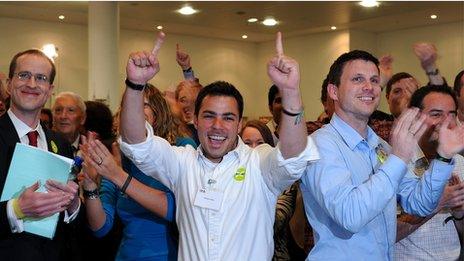
Referendums are suddenly flavour of the month - but does the best side always win or is it all down to clever tactics? Or a combination of both?
Referendums can be bloody, bruising affairs. Unlike general elections, they are a fight to the death between two sides that will never have to face each other at the ballot box again.
There is no prospect of a cosy coalition or compromise. The winner really does take it all.
And although each campaign is different, there are certain factors they all have in common.
So with possible referendums in the pipeline on Britain's relationship with the EU and Lords reform, as well as the upcoming referendum on Scottish independence, here are some tips on how to win from masters of the trade and a few lessons from those they have defeated.
It really is a war
The young strategists behind 2004's campaign to block John Prescott's plans for a regional assembly in the North-East of England sought inspiration from war films - in particular George C Scott's Patton.
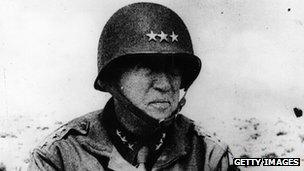
General George Patton: Inspired campaigners in the North-East
It was not enough just to hold your ground, they decided, you had to keep moving forward and unsettling the enemy, as Patton had done in the Second World War.
Neither was it enough to exploit the other side's weaknesses.
"The real trick is to attack their strong points and win, because then the opponent has nothing left with which to retaliate, at which point you can steamroller him," writes former North East Says No kingpin William Norton, in his book White Elephant: How the North-East Said No.
The tactics, and some of the personnel, behind North East Says No resurfaced in last year's successful No to AV campaign and the lessons learned from these two campaigns are certain to carry over into any future EU referendum.
Know your enemy
This might seem obvious, but Yes to AV campaign chief Katie Ghose admits her team did not see some lines of attack coming in last year's battle over changing the Westminster voting system, despite the fact that their opponents ran what she calls a "classic No campaign" based on "cost, complexity and fear".
"You have got to have hard realism about what you are up against," she says, "you can not change public opinion much during the campaign."
Don't just talk to your own supporters
The No campaign's top priority at the start of the AV contest was to reach out to Labour voters, to counter the idea that they were Conservative Party front.
Their opponents struggled to put together a similar cross-party effort.
An early lead can be fatal
The side that takes an early lead in the polls is often the most vulnerable to complacency and has it all to lose, often underestimating the scale of the challenge they face, No campaigners will tell you.
You don't necessarily need a positive message
But it can help to have an answer ready when journalists accuse you of having nothing positive to say. No to AV launched a "Defend One Person One Vote" campaign for this reason.
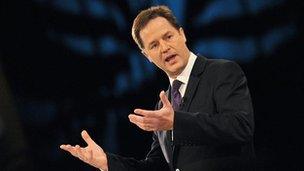
Yes supporter Nick Clegg was the No campaign's trump card
"We knew from our research that people mistrusted the fact that the ballots of some voters under AV would be counted more than once - effectively giving them more votes," says Matthew Elliot, No to AV's director and now head of the Taxpayer's Alliance.
"We also knew that people intuitively saw 'One Person, One Vote' as being the touchstone of a democratic electoral system - everyone from the suffragettes, to the civil rights movement, to the Labour modernisers had campaigned for equal votes.
"Using this slogan gave us our positive message and also highlighted that AV would be a step back for democracy."
But you must control the debate
Getting the opposition to play on your pitch, by your rules, is, perhaps, the most important part of any referendum campaign.
The No campaign's line that AV would cost £250m sparked fury in the Yes camp. They kept issuing denials but all the public heard was "it will cost £250m".
It is by this kind of ju-jitsu that referendums can be won and lost.
Make it relevant to ordinary voters
"Constitutional affairs are pretty abstract for most people," says Matthew Elliott, "compared to their everyday concerns of keeping down a job and ensuring their kids go to a good school, so we had to find a way to make it relevant to their everyday lives".
"Nick Clegg handed this to us on a plate when his MPs voted for a rise in tuition fees.
"Up until that point, all the Lib Dems were known for was being in favour of scrapping tuition fees, so their U-turn on this issue hit their popularity, highlighted the 'broken promises' of coalition government and gave the Labour No to AV campaign a wedge issue to split the progressive alliance in favour of AV."
In other words, it was Nick Clegg wot lost it for his own side.
You don't need celebrities
Declan Ganley, the businessman who successfully campaigned for a No vote in the 2008 Lisbon Treaty in Ireland, and also took part in the 2012 European Fiscal Compact referendum, is no fan of celebrity endorsements.
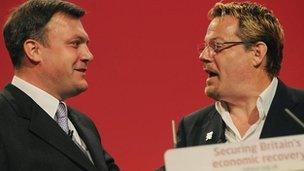
Eddie Izzard was among Labour-supporting celebrities to back Yes to AV
"It is utterly patronising, pathetically ingratiating and intellectually lame," but, he adds: "It works." Even though many well-known people will sign up to anything if someone important-sounding asks them and, he adds, they rarely have a good grasp of detail.
Celebrities can also divide opinion - and don't always help you reach beyond your natural support base.
One Yes to AV campaign leaflet featured a familiar cast of Labour or Lib Dem supporting "luvvies" such as Eddie Izzard, Tony Robinson, Colin Firth and Stephen Fry. One strident critic of the Yes campaign, external, who supported AV, said it almost made them vote No.
Business leaders or academics are a far safer bet, particularly if the referendum is about jobs and the economy. Or - if you need photo opportunities - you could always invest in an eye-catching gimmick like NESNO's inflatable white elephant.
You don't need politicians either - but you do need their parties
The anti-politics vote is a powerful force these days but a referendum is still an election and that means putting together a majority.
And the only way you are realistically going to be able to do that is to rely on existing party structures and volunteers to get your vote out, campaigners on all sides say.
Katie Ghose says her biggest regret was "trying to build a party machine in a matter of months. You just cannot do it".
"You can not win the ground war without the support of a major political party," she adds.
No can mean Yes
Declan Ganley believes No campaigns start with a 5% to 10% disadvantage because they do not have an "affirmative" message.
But Katie Ghose argues that those fighting to retain the status quo - which is usually the No campaign - start with a similar advantage, as many voters do not want to risk change.
But sometimes a yes vote can maintain the status quo.
The UK's first nationwide referendum, external, on membership of the European Economic Community (EEC), was won by the Yes campaign.
But as the country was already a member of the EEC in 1975, voting Yes kept things as they were. The vote also took place a time of deep economic turmoil when it was relatively easy to make the case that Britain could no longer go it alone economically. Which brings us to the final and most important point...
Sometimes you just can't win
You can have the most brilliant tactics, the best grassroots network and the most money but if the political and economic mood is against you, you will more than likely lose.
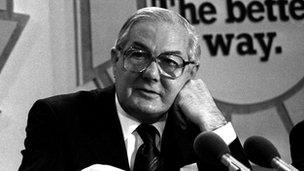
James Callaghan's government held referendums on Scottish and Welsh devolution
The Yes side triumphed in 1997 referendums on devolution in Scotland and Wales, but those votes took place at a time of rising economic self-confidence, with a popular new prime minister, Tony Blair, backing their cause.
Mari James, a leading member of the Yes for Wales campaign, says: "In the '97 campaign the momentum was very much for change, at the beginning of the Blair government."
Scotland and Wales failed to get devolution after referendums in 1979.
The Yes campaign in Scotland won 51.6% of the votes of those taking part in the referendum. But the government stated that 40% of "all" those eligible to take part needed to back the proposal for the referendum to be binding.
The fact that more than a third of people chose not to cast a ballot scuppered the Yes campaign's chances.
Another difference was that the Welsh and Scottish referendums - unlike that of 1997 - took place as the Callaghan government slowly ended amid economic and political meltdown.
There is not very much Yes campaigners can do about this, says Mari James, except to try and create a sense of "momentum" for change.
"The feeling on the streets has to be that this was going to happen anyway so why don't you get on with it?," she says.
This presents a big problem for anyone campaigning for constitutional change, particularly something like Lords reform in which there is perceived to be little public interest, she adds.
Katie Ghose believes the timing of last year's AV campaign, with No-supporting David Cameron still in a honeymoon period, made it tough from the start for the Yes campaign. And the anger over MPs expenses they had hoped to capitalise on had largely abated.
"We wanted to tap into people's disenchantment with politics and explain that this was something that could make a difference. I am not sure that that worked in the strategy".
But the great thing about referendums is that the public always have the final say. And as all good democrats know, they never get it wrong...